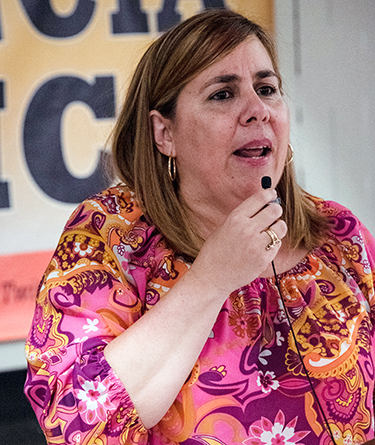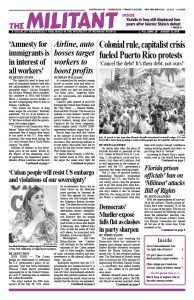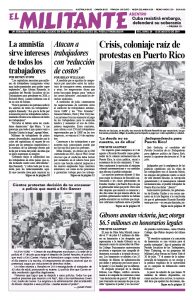
NEW YORK — “The Cuban people are determined to withstand the U.S. government’s policy of aggression,” said Ana Silvia Rodríguez Abascal, Cuban deputy permanent representative to the United Nations, at a July 27 meeting here to celebrate the Cuban Revolution.
The event marked the 66th anniversary of the July 26, 1953, attack by revolutionary forces led by Fidel Castro on the Moncada army garrison in Santiago de Cuba that opened the revolutionary war that brought down the Fulgencio Batista dictatorship. The objective of the action was “to put an end to the foreign domination, misery, unemployment, unsanitary conditions and illiteracy that our people suffered,” said Rodríguez. She paid tribute to those who fought at Moncada, who “offered their lives so that the name of Cuba will always be associated with freedom, justice and dignity.”
Washington’s anti-Cuba Helms-Burton law “violates and infringes on the self-determination of the Cuban people and of other peoples, freedom of trade, sovereign equality and noninterference in the internal affairs of states,” she said.
Rodríguez reported that the U.S. government just announced that it is going to stop granting visas to officials of Cuba’s international solidarity program that provides medical care to people around the world, based on the slander that the doctors are exploited.
“Our internationalist medical solidarity is one of the things we are most proud of,” she said.
“We practice solidarity,” Rodríguez told participants, describing the steadfastness and internationalism of the Cuban Revolution. “We share what we have, not what we have left over.”
She also spoke about the colonial exploitation of Puerto Rico, which was on the mind of many at the meeting. The Cuban Revolution will always support the fight of the Puerto Rican people for independence, she said to applause.
The meeting was sponsored by the New York-New Jersey Cuba Sí Coalition and held at the New York State Nurses Association hall. Some 150 in attendance were welcomed by nurses’ union President Judy Sheridan González.
Bob Guild, vice president of Marazul Tours, which organizes travel between the U.S. and Cuba described the passport restrictions first announced 58 years ago as part of Washington’s efforts to isolate the revolution. Today, he said, despite new travel restrictions enacted by the U.S. government there are still many legal ways to visit the island.
Other speakers included Gail Walker, director of IFCO/Pastors for Peace; Ed Ortiz of A Call to Action on Puerto Rico; Ben Ramos of the Venceremos Brigade; William Camacaro of the Alberto Lovera Bolivarian Circle; and Lucy Pagoada-Quesada of the Honduran National Popular Resistance Front.
“I came to learn why Cuba has been so successful in opposing such a massive power like the U.S. government,” Wilson Ng, a teacher from Hong Kong visiting the U.S., told the Militant after the meeting. “What the Cuban Revolution has accomplished is a good example for the people of Hong Kong who are in struggle today,” he said, pointing to the recent victory for political rights after the biggest demonstrations in the city’s history forced Carrie Lam, its chief executive, to suspend an extradition bill.
Other events to celebrate the Cuban Revolution were held over the same weekend in Chicago and Miami.

